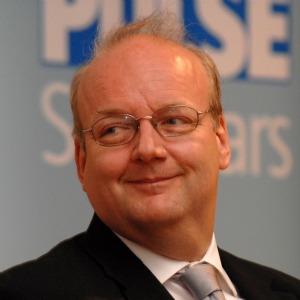Dr Peter Swinyard, chair of the Family Doctor Association
We’re getting to the point where IT gives us an information overload. You get so much information, about such trivia that you get a signal to noise problem, and you don’t always hear the things you really need to hear, because there’s so much else going on.
I’m absolutely in favour of patients telling me what they feel, and what they think is wrong with them. But that’s what I do, I spend most of my life actually trying to interpret what people are telling me, I see my job as a GP very much as an interpreter.
I’m delighted when patients tell me what they think is wrong, because it gives me a chance to know what their worries and fears are. We can start a sensible conversation based on that, and hopefully come to a point where I’ve said “that fear is groundless” or “yes, we’ll take that very seriously and look into it further.”
Now that’s useful conversation, but whether we need to get a computer in the way of it, I don’t’ know. I’m just a little nervous that we believe that if it’s electronic it’s good.
Jeremy Hunt, health secretary
I want the NHS to be a world class showcase of what innovation can achieve. Today’s plan sets out how we can give patients 21st century, personalised healthcare.
Tim Kelsey, NHS England national informatics director
New mothers will now be able to carry their red book around with them on their smart phone and tablet as the NHS moves towards offering digital Personal Child Health Records. This will put an end to worrying about leaving your child’s information at home when going for a review, vaccination, or emergency treatment.
We must embrace modern technology to help us lead healthier lives, and if we want – to take more control when are ill.
Our ambition is to make the NHS a digital pioneer for our patients and citizens.
The framework will set out how real time data will be available to paramedics, doctors and nurses, ensuring patients receive safe and effective at the point of care. All NHS funded care services are expected to have digital and interoperable systems that remove the limitations of paper records and slow bureaucratic systems by 2020.
Andy Williams, chief executive of the Health and Social Care Information Centre
The HSCIC has a key role in supporting local innovation and providing national applications to help information sharing. Ensuring all parts of health and care follow the same standards so that their information systems can talk to each other is crucial, if we are to take advantage of the latest digital technology. Equally required is public trust in our custodianship of national data and the controls we have put in place. Trust depends on openness and responsiveness and the HSCIC remains fully committed to building this into all digital development.
The plans also include:
· NHS ‘Kitemarks’ for trusted smartphone apps which will help patients access services and take more control of their health and wellbeing in 2015
· Patients to be able to access their own GP record from spring2015, and will have full access to care records by 2017. Patients will be able to record their own comments.
· Patients will only have to tell their story once. With consent, care records will be available electronically across the health system by 2018 for urgent care services and 2020 for all services – dramatically improving coordination of care, particularly for those with complex conditions.
· Introducing a digital ‘red book’– helping parents to manage their child’s early health records – in 2016
· Ensuring the NHS remains a leader in the global race to fight disease and as a hub for genomics research. Developing innovative personalised medicines will mean the right treatment, first time.
Professor John Newton, chief knowledge officer of Public Health England
Digital technology and innovation has the potential to not only revolutionise the NHS and but also how individual’s approach and manage their own health and wellbeing. In addition, Public Health England will be contributing its expertise to achieving this transformation.
David Behan, chief executive of the CQC
Using information from the public and from other organisations is a crucial part of how we check the care that people receive – it helps us to make decisions about where and when we inspect. This plan outlines improvements to the way the health and social care system uses data and is a real opportunity to make the NHS and wider health and social care system fit for the modern digital age.
Pulse October survey
Take our July 2025 survey to potentially win £1.000 worth of tokens













